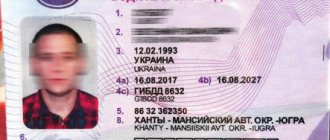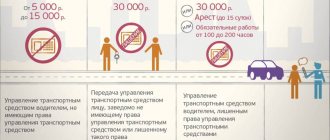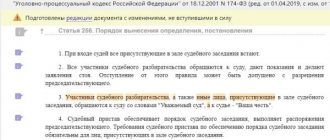If a driver significantly violates traffic rules, his driver's license may be revoked. The process takes place during the trial. Rights can be deprived for up to 3 years, but there are cases when the periods of deprivation of a driver's license are added together and the time period increases to 10, 20 or more years. Under some articles of the law, the amount of punishment varies significantly. If a person is facing a trial for deprivation of a driver’s license, it is important to figure out how to behave competently during the process. A thoughtful approach will allow you to try to reduce the term of imprisonment or avoid punishment altogether.
Why can your driver's license be revoked?
If the driver has violated traffic rules that imply deprivation of a driver’s license, the road inspector will act in accordance with the norms of Federal Law No. 196 of December 10, 1995 “On Road Safety.” He is obliged to draw up a protocol and submit the case to court. Proof of the car owner’s guilt is attached to the document. It may include photo and video evidence, a diagram of the accident, the results of a medical examination and eyewitness testimony. The information is certified by their signatures. The reasons that can lead to the deprivation of a driver's license are enshrined in Chapter 12 of the Code of Administrative Offenses of the Russian Federation.
Attention! If you have any questions, you can chat for free with a lawyer at the bottom of the screen or call Moscow; Saint Petersburg; Free call for all of Russia.
| Reasons for deprivation of a driver's license | |
| Articles of Chapter 12 of the Code of Administrative Offenses of the Russian Federation | Explanation |
| 12.2 | The citizen was driving a car without license plates |
| 12.5 | Driving was carried out in a vehicle on which operational service signs, a signaling device and red lights were illegally installed |
| 12.8 | Driving while drunk |
| 12.9 | The citizen greatly exceeded the established speed limit |
| 12.10 | The citizen neglected the current rules when crossing the railway tracks, or stopped on them |
| 12.15 | The driver entered the oncoming lane in areas prohibited for overtaking |
| 12.16 | The driver was driving against the direction of traffic on a one-way road |
| 12.21 | Violations were committed during the transportation of goods |
| 12.24 | A citizen was the culprit of an accident, as a result of which people received mild to moderate injuries |
| 12.26—12.27 | The citizen refused to undergo a medical examination at the time of the incident |
| 12.27 | The driver left the scene of the accident |
Normative base
First of all, a citizen must know the traffic rules of the Russian Federation. Here are the driving rules that must be followed when driving on the road. If a person neglects the rules, he may be deprived of his driver's license in court.
Additionally, it is worth familiarizing yourself with the norms of the Code of Administrative Offenses of the Russian Federation. In particular, it is recommended to study Chapter 12. This sets out the punishment to which a driver who neglects the rules may be subjected. The Administrative Code reflects situations in which a citizen may be deprived of his driver's license in court.
It is also necessary to know the provisions of Federal Law No. 196 of December 10, 1995 “On Road Traffic Safety”. The regulatory legal act reflects the rules for allowing a citizen to drive a vehicle, records the actions of a traffic police officer in the event of an incident, reflects the procedure for prohibiting the operation of a car and approves the rights and obligations of road users.
Procedure for considering the case
If an offense has occurred, the inspector will draw up a protocol, prepare accompanying documentation and submit the case of deprivation of the driver's license for consideration in court. The current situation will be reviewed within 15 days. A summons is then sent to the offender.
In practice, the summons does not always reach the driver in a timely manner. If the notification is not received, there is a risk of missing the meeting. In this case, the citizen will not have a chance to challenge the offense and the deprivation of his driver’s license. To avoid finding yourself in such a situation, it is recommended to independently find out the date of the trial in court. To do this, you should visit the traffic police department yourself.
You can also find out the date of consideration of the case on deprivation of a driver’s license through the website of the State Traffic Inspectorate. To obtain information, you will need to go to the official traffic police page on the Internet and scroll down the page. Here is a list of online services. You must click on Driver Check. The system will redirect the citizen to a page with an online form. Here you must indicate the series and number of the driver's license and the date of issue. Then you need to click on the Request Verification item.
Litigation for deprivation of driver's license
When the protocol is submitted to the court, all materials collected by the traffic police officer are accepted for processing. The magistrate will set a date and time for the trial. The driver will be sent a summons.
The car owner who committed the violation is a full participant in the proceedings. He can study all the materials provided to the court, present his evidence and defend his point of view. When starting the process, the judge will explain to the citizen his rights and ask whether the driver has any petitions. If a citizen has prepared a written explanation of what happened, it is included in the case materials. Then the person must verbally explain his position and the circumstances of what happened. Based on the protocol and additional papers, the judge will ask questions.
If a traffic police officer committed an offense during a stop or communication with a citizen, you must report it. Often the inspector who was involved in drawing up the protocol is brought in as a witness. Experts advise resisting his position and demanding clarification on each point.
You can't make excuses. If any document was drawn up in violation of current legislation, it is worth filing a petition to exclude the document or declare it invalid. If one of the necessary documents for the consideration of the case is missing, you can request it and request a postponement of the trial. If the judge refuses to accept the motion, the action can be appealed.
During the next stage of the proceedings, the citizen has the right to demand that witnesses and witnesses, if any, be invited to court. If a decision is made to revoke your driver's license, you can try to appeal it. If there is insufficient evidence, the proceedings are terminated.
Is attendance required?
The presence of the accused is necessary when considering the case, since only in this way will the driver be able to defend his rights by expressing his position and providing the court with the necessary facts and information.
What happens if you don't show up?
If the offender fails to appear in court, there will be no fine or punishment. Then the case will be considered in the absence of the accused , on the basis of documents and facts provided by the traffic police inspector. In this case, it will be almost impossible to prove your innocence.
Drivers who fail to appear in court often wonder: was their license revoked? You can find out the answer online using the traffic police database; read about how to do this in our article. We talked about other legal ways to check for deprivation of a driver's license here.
How does the trial for revocation of a driver's license for alcohol intoxication proceed?
If traffic police officers suspect that the driver is intoxicated, an inspection will be carried out. A traffic police officer can do everything independently using a breathalyzer. The action is carried out in the presence of two witnesses. The device must show the results on a display and issue them on paper.
If the driver doubts the test results, he is sent to a medical facility for a full examination. Only a doctor with the appropriate certificates can perform the procedure. Based on the results of the inspection, a report is drawn up. It is prepared in 2 samples, which are attached to the case materials.
The papers are then sent to the court. Proceedings regarding the deprivation of a driver's license will follow the same pattern as in the classic situation. A citizen has the right to request that witnesses be brought in and to point out inconsistencies between the inspector’s testimony and the case materials. It is important to first study all documents that supplement the protocol. If the court rejects any petition, the citizen can appeal its decision by appealing to a higher authority.
Pre-trial process
When a driver commits an offense, a traffic police officer must draw up a protocol. It includes witness statements, photos from the scene of the accident, the results of a medical report, a diagram of the vehicle at the time of the accident and much more. The offender may sign the protocol or refuse to do so. Experienced drivers still recommend signing this document, having first indicated the reason for their disagreement with the inspector’s opinion. In addition, you can outline your vision of the situation as a whole regarding the accident that occurred.
IMPORTANT !!! The traffic police officer must transfer the available evidence to the judicial authorities, after which a hearing date will be set, and the participants in the accident will receive notification of this. If the hearing is about depriving the driver of his license, it is best for the latter to get a good lawyer.
This will make it much easier to defend your innocence in court. There are many points that serve as justifying or mitigating circumstances, on the basis of which the measure of restraint can be significantly reduced.
How does the trial for deprivation of a driver's license for driving into the oncoming lane work?
If a driver violates traffic rules and drives into oncoming traffic, he may be deprived of his license for a period of four to six months. Such information is contained in Article 12.15 of the Code of Administrative Offenses of the Russian Federation. Repeated violation will result in an increase in the sentence to 1 year. However, the punishment may be replaced by a fine.
Having stopped the driver, the inspector will draw up a report. Then the traffic police commission examines the case. She may decide to deprive her of her license or impose a fine. If the first option is chosen, the case goes to trial. The judge considers the circumstances of the case and decides to impose a fine or deprivation of rights for driving into the oncoming lane.
Resolution of the Supreme Court of the Russian Federation dated December 24, 2018 N 32-AD18-15
SUPREME COURT OF THE RUSSIAN FEDERATION
RESOLUTION
dated December 24, 2021 N 32-AD18-15
Judge of the Supreme Court of the Russian Federation S.B. Nikiforov, having considered the complaint of defender I.A. Shapkina, acting in the interests of Buchkov Alexander Nikolaevich, against the decision of the magistrate of judicial district No. 3 of the Kirovsky district of Saratov dated February 8, 2021, which entered into legal force, decision of the judge of the Kirovsky District Court of Saratov dated April 10, 2021 and the decision of the Deputy Chairman of the Saratov Regional Court dated May 22, 2021, issued against Buchkov Alexander Nikolaevich (hereinafter referred to as Buchkov A.N.) in the case of an administrative offense under Part 2 Article 12.7 of the Code of the Russian Federation on Administrative Offences,
installed:
by the decision of the magistrate of the judicial district No. 3 of the Kirovsky district of Saratov dated February 8, 2021, left unchanged by the decision of the judge of the Kirovsky district court of Saratov dated April 10, 2021 and the decision of the deputy chairman of the Saratov regional court dated May 22, 2021, Buchkov A. N. found guilty of committing an administrative offense under Part 2 of Article 12.7 of the Code of the Russian Federation on Administrative Offenses, and subjected to administrative punishment in the form of an administrative fine in the amount of 30,000 rubles.
In a complaint filed with the Supreme Court of the Russian Federation, Shapkin’s lawyer I.A. asks to cancel the judicial acts taken in this case, citing arguments about their illegality.
Studying the materials of the administrative offense case and the arguments of the applicant’s complaint allows us to come to the following conclusions.
In accordance with Part 2 of Article 12.7 of the Code of the Russian Federation on Administrative Offenses (as amended in force at the time of the occurrence of the circumstances that served as the basis for bringing A.N. Buchkov to administrative responsibility), driving a vehicle by a driver deprived of the right to drive vehicles entails the imposition of an administrative a fine in the amount of thirty thousand rubles, or administrative arrest for a term of up to fifteen days, or compulsory labor for a period of one hundred to two hundred hours.
By virtue of clause 2.1.1 of the Traffic Rules, approved by Resolution of the Council of Ministers - Government of the Russian Federation of October 23, 1993 N 1090 (hereinafter referred to as the Traffic Rules), the driver of a motor vehicle is obliged to carry with him and, at the request of police officers, hand over to them, for checks, including a driver’s license or temporary permit to drive a vehicle of the relevant category or subcategory.
The basis for the magistrate’s decision to appoint Buchkov A.N. Administrative punishment under Part 2 of Article 12.7 of the Code of the Russian Federation on Administrative Offenses was based on the fact that on December 22, 2021 at 10:10 a.m. in the area of house 343 A on Sokolova Street in the city of Saratov, he was driving a Nissan vehicle, state registration plate < … > being deprived of the right to drive vehicles.
We cannot agree with this decision for the following reasons.
In accordance with Article 24.1 of the Code of the Russian Federation on Administrative Offences, the objectives of proceedings in cases of administrative offenses are a comprehensive, complete, objective and timely clarification of the circumstances of each case, its resolution in accordance with the law, ensuring the execution of the decision, as well as identifying the causes and conditions, contributing to the commission of administrative offenses.
According to Article 26.1 of the Code of the Russian Federation on Administrative Offenses, among other circumstances in a case of an administrative offense, the existence of an event of an administrative offense is subject to clarification; a person who has committed unlawful actions (inaction), for which the said Code or the law of a constituent entity of the Russian Federation provides for administrative liability, as well as his guilt in committing an administrative offense.
From the case materials it appears that by the resolution of the acting Magistrate Judge of Judicial District No. 7 of the Leninsky District of Saratov dated May 28, 2012 Buchkov A.N. was found guilty of committing an administrative offense under Part 4 of Article 12.15 of the Code of the Russian Federation on Administrative Offences, with a penalty of deprivation of the right to drive vehicles for a period of 5 months.
This resolution came into force on June 9, 2012.
According to Part 1 of Article 32.6 of the Code of Administrative Offenses of the Russian Federation (as amended in force at the time of entry into force of the magistrate’s decision dated May 28, 2012), the execution of a decision on deprivation of the right to drive a vehicle of the corresponding type or other types of equipment is carried out by confiscating the driver’s license, respectively. certificates, certificates for the right to drive vessels (including small ones) or certificates of a tractor driver (tractor driver), if the driver, navigator or tractor driver (tractor driver) is deprived of the right to drive all types of vehicles, vessels (including small ones) and other equipment, or a temporary permit to drive a vehicle of the appropriate type.
By virtue of Article 32.7 of the said Code (as amended on June 8, 2012), the period of deprivation of a special right begins from the day the resolution imposing an administrative penalty in the form of deprivation of the corresponding special right comes into force (Part 1).
Within three working days from the date of entry into force of the resolution imposing an administrative penalty in the form of deprivation of the corresponding special right, a person deprived of a special right must submit the documents provided for in parts 1 - 3 of Article 32.6 of the Code of Administrative Offenses of the Russian Federation to the executing body this type of administrative punishment (if the documents specified in part 1 of article 32.6 of this Code were not previously seized in accordance with part 3 of article 27.10 of the said Code), and in case of loss of these documents, report this to the specified authority in the same term (part 1.1 of article 32.7 of the Code of the Russian Federation on Administrative Offences).
If a person deprived of a special right evades submitting the relevant certificate (special permit) or other documents, the period of deprivation of the special right is interrupted. The period of deprivation of a special right begins from the day a person surrenders or withdraws from him the corresponding certificate (special permit) or other documents, as well as the receipt by the body executing this type of administrative punishment of the person’s statement about the loss of these documents (Part 2 of Article 32.7 of the above Code).
When considering this case, the courts came to the conclusion that Buchkov A.N. after the ruling of the magistrate dated May 28, 2012 entered into legal force, he evaded surrendering his driver’s license, and therefore the period of deprivation of the special right was interrupted on December 22, 2021 (at the time related to the event of the administrative offense) Buchkov A.N. was deprived of the right to drive vehicles.
Meanwhile, when drawing up a protocol on an administrative offense and considering the case by the courts, Buchkov A.N. consistently stated that he did not evade submitting his driver’s license; the license was confiscated from him by police officers when drawing up procedural documents in 2012, after the acting decree came into force. The magistrate judge of judicial district No. 7 of the Leninsky district of Saratov dated May 28, 2012 was kept in the case materials and returned to him after the expiration of the five-month period of deprivation of the right to drive vehicles.
By virtue of Part 3 of Article 27.10 of the Code of the Russian Federation on Administrative Offenses (as amended on June 8, 2012), when an administrative offense is committed that entails deprivation of the right to drive a vehicle of the corresponding type, the driver’s license, the tractor operator’s license ( tractor driver), boatmaster's license, pilot's license and a temporary permit is issued for the right to drive a vehicle of the appropriate type for the period until the decision on the administrative offense comes into force, but not more than for two months. If the case of an administrative offense is not considered within two months, the validity period of a temporary permit for the right to drive a vehicle of the appropriate type, at the request of the person in respect of whom the proceedings for the administrative offense are being conducted, is extended by the judge, body, official, authorized consider a case of an administrative offense for a period of no more than one month for each appeal. When filing a complaint against a decision in a case of an administrative offense, the validity period of a temporary permit for the right to drive a vehicle of the corresponding type is extended by the judge or official authorized to consider the complaint until a decision is made on the complaint against the decision in a case of an administrative offense.
As follows from the protocol on administrative offense 62 AA N 507402, drawn up in relation to Buchkov A.N. under Part 4 of Article 12.15 of the Code of the Russian Federation on Administrative Offenses, police officers, on the basis of Part 3 of Article 27.10 of this Code, confiscated the driver’s license of the series <...> from the named person, and issued a temporary permit to drive vehicles of the series <...>, which is consistent with requirements of the above norms (case of administrative offense No. 5-255/2012).
From the covering letter of the deputy head of the State Traffic Safety Inspectorate of the Russian Ministry of Internal Affairs for the city of Saratov dated July 13, 2012 N 8/5435 to the magistrate of the judicial district No. 8 of the Leninsky district of the city of Saratov, it is seen that a copy of the resolution in the case of administrative offense No. 5-255/2012 in regarding Buchkova A.N. received by traffic police officers without a driver's license.
According to the certificate of the magistrate of court district No. 7 of the Leninsky judicial district of Saratov, the driver’s license of A.N. Buchkov. was received at the court site along with a protocol on an administrative offense on May 24, 2012 and was stored in the materials of case No. 5-255/2012. Upon expiration of the period of deprivation of the right to drive vehicles, the driver’s license of the series <...> was returned to A.N. Buchkov. November 14, 2012, about which there is a receipt in the materials of the named case.
Thus, the case materials confirm the fact of confiscation of A.N. Buchkov’s driver’s license. by police officers when drawing up procedural documents in 2012.
From the literal interpretation of Part 1.1 of Article 32.7 of the Code of the Russian Federation on Administrative Offenses, a person deprived of a special right within three working days from the date of entry into force of the decision imposing an administrative penalty in the form of deprivation of the corresponding special right must surrender a driver’s license to the body executing this type administrative punishment, if the driver’s license has not previously been confiscated in accordance with Part 3 of Article 27.10 of the said Code.
The fact that the magistrate, when sending a copy of the decision made to the traffic police authority for the execution of the imposed punishment, did not include A.N. Buchkov’s driver’s license, stored in the case materials, as well as the lack of information from the traffic police officers about the surrender of A.N. Buchkov’s driver’s license. and storage of the said certificate in the case materials does not indicate the latter’s evasion from submitting the said document.
Taking into account the fact that the driver’s license was confiscated from A.N. Buchkov. by police officers when drawing up a protocol on an administrative offense under Part 4 of Article 12.15 of the Code of the Russian Federation on Administrative Offenses, and in the decision of the magistrate dated May 28, 2012, the procedure for executing the decision, the conclusion of the courts in the present case about the evasion of A.N. Buchkov, was not explained. from passing a driver's license is unreasonable.
By virtue of the provisions of parts 1 and 4 of Article 1.5 of the Code of the Russian Federation on Administrative Offenses, a person is subject to administrative liability only for those administrative offenses in respect of which his guilt has been established. Irremovable doubts about the guilt of a person brought to administrative responsibility are interpreted in favor of this person.
In accordance with paragraph 4 of part 2 of Article 30.17 of the Code of the Russian Federation on Administrative Offenses, based on the results of consideration of a complaint, protest against a decision in a case of an administrative offense that has entered into legal force, decisions based on the results of consideration of complaints, protests, a decision is made to cancel the decision in a case of an administrative offense , decisions based on the results of consideration of a complaint, protest and on termination of proceedings in the case in the presence of at least one of the circumstances provided for in Articles 2.9, 24.5 of the said Code, as well as in the absence of proof of the circumstances on the basis of which the specified resolution or decision was made.
Under such circumstances, the decision of the magistrate of the judicial district No. 3 of the Kirovsky district of Saratov dated February 8, 2021, the decision of the judge of the Kirovsky district court of Saratov dated April 10, 2018 and the decision of the deputy chairman of the Saratov regional court dated May 22, 2021, issued in relation to Buchkova A.N. in a case of an administrative offense provided for in Part 2 of Article 12.7 of the Code of the Russian Federation on Administrative Offences, are subject to cancellation.
Taking into account the fact that at the time of consideration in the Supreme Court of the Russian Federation the complaint of the defender Shapkina I.A. statute of limitations for attracting Buchkov A.N. administrative liability established by part 1 of article 4.5 of the Code of the Russian Federation on administrative offenses has expired, the proceedings in this case of an administrative offense by virtue of the provisions of paragraph 4 of part 2 of article 30.17 and paragraph 6 of part 1 of article 24.5 of the said Code are subject to termination due to the expiration of the term statute of limitations for bringing to administrative responsibility.
Based on the above, guided by Articles 30.13 and 30.17 of the Code of the Russian Federation on Administrative Offences, the judge of the Supreme Court of the Russian Federation
decided:
resolution of the magistrate of the judicial district No. 3 of the Kirov district of Saratov dated February 8, 2021, decision of the judge of the Kirov district court of Saratov dated April 10, 2021 and the resolution of the deputy chairman of the Saratov regional court dated May 22, 2021, issued in relation to Buchkov Alexander Nikolaevich in the case of an administrative offense provided for in Part 2 of Article 12.7 of the Code of the Russian Federation on Administrative Offences, cancel.
The proceedings in this case of an administrative offense are terminated on the basis of paragraph 6 of part 1 of Article 24.5 of the Code of the Russian Federation on Administrative Offences.
Supreme Court Judge
Russian Federation
S.B.NIKIFOROV
How does the trial for deprivation of a driver's license for crossing a solid line proceed?
If a driver crosses a solid line, he may face a warning or a fine of up to 5,000 rubles. If you are overtaken, your driver's license may be revoked. The confiscation of the certificate is carried out after the trial.
The consideration of the case is carried out according to the classical scheme. The compiled protocol is submitted to the court. During the proceedings, the circumstances of the case and the testimony of witnesses and participants in the incident are taken into account. A final decision is then made. It can be appealed by appealing to higher courts.
Is this considered a criminal record?
Deprivation of a driver's license is an administrative penalty for offenses. This penalty does not provide for a criminal record (for example, Article 12.8 of the Code of Administrative Offenses of Russia). A criminal record can only appear if a criminal offense has been committed.
A criminal record can be obtained for repeated driving while intoxicated, according to Art. 264.1 of the Criminal Code of the Russian Federation (we talked in detail about what is considered a repeated violation and what punishment the driver faces for this, here).
Whether a criminal record is assigned or not depends on the specific act . If an accident occurs in which a person is killed or suffers harm to his health, then the driver may be sentenced according to the Criminal Code of the Russian Federation in the form of imprisonment (for up to 5 years) or forced labor (for up to 4 years).
What does the court's decision depend on?
The driver is found guilty if his offense is proven. A citizen can try to refute the inspector's arguments by providing relevant evidence. If the judge has doubts about guilt, he can acquit the driver. If there is obvious evidence of innocence, the proceedings are terminated. This rule is enshrined in Article 29.9 of the Code of Administrative Offenses of the Russian Federation. If errors were made during the arrest or registration of the protocol, this may affect the court decision. The following factors may also affect the proceedings:
- providing photo and video evidence confirming the citizen’s innocence or exonerating him;
- admission of one’s own guilt and proof that the offense was committed unintentionally;
- presence of a clean driving record;
- engaging a good car lawyer in the proceedings;
- there were errors in the protocol;
- the report was drawn up without the presence of the person responsible for the incident;
- the person was able to prove that at the time of the incident he was influenced by external factors.
Errors in protocol preparation
Based on Part 2 of Article 28.2 of the Code of Administrative Offenses of the Russian Federation, a traffic police officer is obliged to draw up a protocol according to the scheme below :
- Must provide reliable information about the location of the incident and the time the document was drawn up.
- The protocol form must contain the correct data of the traffic police officer (full name), as well as his position.
- Information about the offender.
- Place and time of incident;
- Classification of the violation with the corresponding article of the Code of Administrative Offences.
- Other important information clarifying the circumstances of the incident.
Consequently, any violations in the design may be regarded as errors.
IMPORTANT! After drawing up the protocol, the traffic police officer is obliged to explain to the perpetrator of the incident his rights and obligations, writing this down in a special column. After familiarization, the driver must sign a document and state his claims to the inspector and point out mistakes (if any were made).
also worth paying attention to the following nuances when filling out the protocol :
- The inspector must mark blank fields of the document with dashes. This must be done so that the driver can make sure that additional information will not be added to the empty columns later.
- The “Description” column should display in detail the circumstances of the incident. Since the court and the lawyer will subsequently rely on the data written in the protocol.
- An inspector can make a grave mistake when he forgets to indicate in the document “Rights and responsibilities explained,” or does not explain them to the driver.
- Before signing, the motorist has the right to demand an explanation for the traffic violation and express his comments on the administrative case in writing.
And if the driver notices any slightest violations in the actions of a traffic police officer or when drawing up a protocol, he must set this out in detail in the document, justifying his disagreement. In this case, this will allow the accused to take a more advantageous position at the trial, and may influence the final decision of the judge. - If an inspector uses devices such as a breathalyzer or radar during an arrest, he is required to indicate in the report information about checking the device, including permission to use it.
If the inspector refuses to show the driver documents for the device, this may be regarded as a violation on the part of the road service employee.
Thus, any errors in the preparation of the protocol made by the inspector may be the fundamental factor that will help the driver defend his rights.
How to behave in court when your driver's license is revoked?
When going to a court hearing to revoke a driver's license, you must give preference to business attire. It is necessary to look clean and tidy. You can't be late. If a citizen arrives later, this is considered disrespect. You must have your passport with you. Additionally, it is worth bringing with you documents related to the case. Experts recommend grabbing a pen and blank sheets of paper. During the proceedings, it may be necessary to file a motion. You need to behave confidently and calmly. Answers to the judge's questions are given in essence. It is necessary to address the person acting in this role using the expressions “Your Honor” and “Dear Court.”
You need to speak loudly, clearly and clearly. There's no need to rush. It is always necessary to answer the essence of the question. Proceedings in cases of deprivation of rights are held in an open manner. A citizen has the right to invite media representatives. It is worth resorting to their help if a person is sure that he did not violate traffic rules and became a victim of a setup. Usually journalists willingly agree to attend meetings. For them, proceedings serve as material for a video or publication. In their presence, the judge will follow all legal procedures and consider the case objectively.
When taking part in the proceedings, a citizen should not try to prove his own innocence, but point out violations committed by traffic police officers in the process of preparing documentation. It is worth focusing attention on all inconsistencies. This confirms the citizen's innocence. If for any reason it is not possible to provide a document confirming the driver’s eligibility, you must draw up a written request to request paper from the relevant authority. At the same time, a motion is filed to postpone the hearing until the document is received. The judge may reject the citizen's claims. However, this gives him a reason to appeal the decision to a higher authority.
You must use only facts. There is no need to give in to emotions. All documents proving the case must be prepared in duplicate. One is sent to court, the second remains in hand. It is recommended to prepare a petition to call witnesses, witnesses and traffic police officers who executed the protocol on deprivation of rights.
What happens if you don't appear in court?
There are no penalties for failure to attend court proceedings regarding the revocation of a driver's license. If the driver does not come to the meeting, the proceedings will be carried out without him. However, the citizen deprives himself of the opportunity to prove his innocence. The decision will be made in accordance with the facts provided by the traffic police officer. Almost always, a driver who neglects to attend the trial is deprived of his license. If a citizen prepares an evidence base, takes an active part in the meeting, and states his position, there is a possibility of winning the case and maintaining the ability to drive a vehicle.
Is it possible to appeal the decision?
If it was not possible to defend innocence at the first court hearing, the citizen can appeal the decision within ten days. City and district courts often change sentences. The decisions made by the magistrate as correct are more fair. You can continue to litigate to a higher court.
If the violator wants to fight for his rights, he must:
- Collect as much information as possible from the stopping place.
- Record a conversation with inspectors;
- Take photographs of instrument readings;
- Take and save contacts of witnesses;
- Collect video materials.
If we are talking about an accident, you can invite an independent auto expert. He will make a conclusion about the circumstances of the incident and assess the amount of damage.
In accordance with Article 30.1 of the Administrative Code, a decision made by a judge can be appealed . In order for the procedure to be carried out successfully you need:
- Comply with the deadline for filing an appeal;
- Analyze the material;
- Prepare evidence.
How can I find out about the court's decision?
If for some reason a citizen was unable to attend the meeting, it is important to promptly find out the court’s decision regarding the deprivation of the driver’s license. Within 10 days after the decision to revoke your driver's license, you must stop driving. If a citizen has neglected the rules, the inspector may fine him at the place of detention when stopping. The amount of the penalty will be 30,000 rubles. Instead of a fine, a citizen may be forced to work 200 hours for the benefit of society or imprisoned for 15 days. Such norms are fixed in Article 12.7 of the Code of Administrative Offenses of the Russian Federation.
For the convenience of citizens, there are several ways to obtain information about a court decision. He can:
- personally visit the State Traffic Safety Inspectorate of the Russian Federation and contact an employee of the institution with a request for information;
- get to the nearest traffic police post;
- personally visit the court office;
- send a request to the State Traffic Inspectorate by mail.
Information can also be obtained via the Internet. The request can be sent through the website of the State Traffic Safety Inspectorate, FSSP and State Services.
Features of the trial
All participants in the process must be notified of the date and time of the trial. During the preparatory part, the judge must announce the circumstances of the trial, check all the participants in the meeting who have appeared, and explain to them their rights and obligations.
IMPORTANT !!! In the main part of the process, each party presents evidence and explains its vision of the situation. In this part of the trial, witness testimony occurs, an expert opinion is announced, and video materials are provided.
The judicial process ends with the issuance of a decision on deprivation of rights, refusal of the claim or transfer of the case to another court. If you disagree with the decision of the judicial authorities, either party can file an appeal, which is called an “appeal.”
How to get a resolution?
In practice, you may encounter a situation where a decision to deprive a driver’s license has been made, but the decision has not been issued to the citizen. Documents are required to be submitted to the traffic police. Usually the court sends papers to the State Traffic Inspectorate electronically. However, they may also be delayed.
To speed up the process of obtaining a ruling, you can contact the court office. The original paper is kept there. The citizen will have to write a statement. Based on the document, a copy of the resolution will be provided. If the driver is present, a copy of the paper is issued after the appropriate decision is made. In another situation, the document is sent by registered mail. The paper will be sent within 5 days. The document will be received at your place of registration.
You do not need an order to get your driver's license back. When you receive the document back, you just need to come to the traffic police department. You must have a passport and a document confirming the seizure of your driver's license. It is provided when submitting documents. Sometimes a medical certificate is required. Starting from September 2013, you will have to pass a theoretical exam on your knowledge of traffic rules. In other situations, rights will not be returned after deprivation.
When does the decision take effect?
The process of receiving a decision is regulated by Article 31.1 of the Code of Administrative Offenses of the Russian Federation. The moment occurs within 10 days from the date of publication of the resolution. The rule applies if the court decision has not been appealed. If a corresponding decision is made, the citizen is obliged to surrender his driver's license. The action is carried out within 3 days from the moment the resolution comes into force. The period of deprivation begins to be calculated from the moment the document is submitted.
The driver's license will be kept at the traffic police department. Time limit. Storage is for a maximum of three years. If within this period the person does not submit an application demanding the return of the document, it will be cancelled. You will be able to restore your driving privileges after passing all driving tests.
Limitation periods
Once the statute of limitations has expired, the offender cannot be held accountable. This period varies for each offense within a fairly wide range. In case of an administrative offense, a person can be held accountable only within 3 months, but there are a number of exceptions to this rule. For some offenses the statute of limitations is 1 year.
These include situations:
- when a traffic violation resulted in harm to the health of one of the participants in the accident,
- if the driver refuses a medical examination,
- when transferring control to a person under the influence of alcohol,
- when the accident resulted in the death of a person or several persons,
How to win a court case for deprivation of rights?
A lawsuit on deprivation of rights can be won if there was no traffic violation and the accusations are false. In this situation, you will need to prove your innocence by attaching supporting documents and providing testimony. If an offense has actually been committed, there is also a chance to avoid deprivation of a driver’s license. No penalty will be imposed if the driver proves that significant errors were made during the registration of the offense. These include:
- errors were made when drawing up the protocol;
- no witnesses were involved;
- the driver suspected of drinking alcohol while driving was not informed of the procedure for conducting a medical examination;
- There is no driver’s signature confirming that he has read the protocol.
If a person is confident in his own innocence, there is no need to admit guilt; the citizen has the right to submit a petition to postpone the hearing to another date. Additional time will allow you to get advice from a car lawyer and prepare additional documents confirming the arguments presented.
What can influence a decision in favor of the accused?
ATTENTION! If you do not submit your driving license on time, the offender risks artificially increasing the period of deprivation of rights, since the punishment will be suspended until he appears at the traffic police and surrenders his document.
The following factors may influence the court's decision in favor of the offender:
- Errors when drawing up a protocol by a traffic police inspector (if any).
- An important role is played by the absence of traffic violations in the driver's past (the total driving experience and the absence of fines are considered).
- Photo and video materials from the scene of the accident were not provided for the case under consideration.
- A sincere confession from the perpetrator of the trial. However, there is no need to talk about intentional violation of rights. It is better to emphasize that what happened was a matter of chance.
- If the driver is asked questions that are not related to the traffic accident (family, work, education), this can also be regarded as a violation on the part of the inspector.
- Rudeness and rudeness towards an offender from a traffic police officer.
In addition, the court's decision may be influenced by a motion for non-deprivation of rights. We talked in detail about how to compose and submit it in a separate article.
Appealing a court decision
If a citizen is not satisfied with the court decision, he can try to appeal it. 10 days are given for this from the date of publication of the resolution. The citizen will need to file an appeal. To increase the chance of a positive outcome of the case, it is recommended to hire a competent lawyer. Additionally, you will need to summarize the facts that play in the driver’s favor:
- the traffic light was faulty;
- workers repaired the damaged roadway;
- potholes were present and the overall quality of the road surface was poor;
- there were no warning signs;
- the road surface was not treated in icy conditions.
If there are factors that justify the driver, there is a chance to reduce the period of deprivation of a driver's license or replace the punishment with a fine.
Judicial practice on deprivation of rights
In practice, the application of current legislation can be carried out in different ways. Thus, a citizen was deprived of her driver's license for six months for driving while intoxicated. When the magistrate made his decision, the woman filed a petition with the appeal court. In the document, she admitted the violation. In response to the petition, the woman was sent a letter stating that the term of arrest under Article 12.27 of the Code of Administrative Offenses of the Russian Federation had been reduced. The driver's license was returned within a month.
In the second situation, the citizen was faced with the dishonest work of a magistrate. During the proceedings, gross violations and mistakes were made. To restore his license, the driver filed a lawsuit. The Court of Appeal upheld the citizen's complaint. The legal proceedings were terminated due to the expiration of the statute of limitations. The driver's license was returned.
Based on the above, the driver has a chance to count on mitigating circumstances if the line of defense is correctly constructed.
Online verification of a court decision
Having the number of the resolution, you can find out its contents (within the limits permitted by law) online. For this:
- Go to the Justice website.
- Select the “Judges of the Peace” section.
- On the page that opens, click “Case Search.”
- Select the subject of the federation and the case number.
- Click the Find button.
You must enter the case number carefully. It can be indicated (known) in the format “AA/B – ВВВВ”, where AA is the number of the magistrate’s precinct, and B and C are digital identifiers. However, the number is entered into the search as “B-BBBB/year of opening of the case.” For example, with case number 55/1-1234, opened in 2015, you need to enter 1-1234/2015.
Nuances
If a citizen has to take part in the proceedings, it is recommended to prepare in advance a list of questions that the driver will ask eyewitnesses. This will allow you not to get lost in court and feel more confident. You need to be meticulous and try to destroy their position by finding out the contradictory circumstances. This will allow the citizen to prove his innocence. There is no need to feel embarrassed. You need to act confident. The prosecution should be asked to explain in detail its position and the specifics of the situation. If documents containing inaccuracies are attached to the case, you must demand that they be removed from the list.
When the position of the prosecution ceases to seem undeniable, and the citizen himself gives a clear explanation of the current situation, you can demand that witnesses be called. These persons must be present when the protocol is drawn up. The prosecution may raise objections. It is necessary to inform that the action is not being carried out to delay the proceedings, but to confirm the case materials that were previously provided. During the trial, other circumstances may be revealed that will play against the citizen. You need to be prepared for this. There is no need to agree to a request to admit guilt in exchange for a reduced sentence. Once this happens, the proceedings will end. If new facts are discovered, you can apply to postpone the trial. It is necessary to study the information and use it when building a line of defense.
In accordance with Article 46 of the Constitution of the Russian Federation, a citizen has the right to use the assistance of a highly qualified lawyer. This feature can be used if a person is denied additional time for a detailed consideration of newly discovered facts. The time provided for preparation can be used to understand how to proceed further. However, it is not necessary to hire a lawyer.
If the court has decided to deprive the driver of his driving license, you should not fall into despair. You can appeal the decision within 10 days by contacting a higher authority. There is no fee for carrying out actions.
If the guilt is undeniable, the fact of a violation is confirmed, there is practically no chance of successfully challenging the decision. Most often, you will have to wait until the punishment is completed and regain your rights only after the specified period has expired.
What traffic violations does the court consider?
This list is regulated by regulations and may vary depending on various factors. However, in the context of our proceedings, we are interested in cases where punishment implies deprivation of a driver's license, and this list is strictly limited by Chapter 12 of the Code of Administrative Offenses of the Russian Federation.
Main (in terms of severity of punishment) violations:
- Driving a vehicle without license plates, registration, etc.
- Not giving priority to cars with a special signal.
- Violation when crossing a railway crossing.
- Significantly exceeding the speed limit.
- Driving into the oncoming lane.
- Violations when transporting organized groups of children.
- Fake special signals.
- Illegal leaving the scene of an accident.
- Driving while intoxicated, incl. refusal of examination.
At the same time, there are separate penalties for repeated violations, and within these, the reasons may be of varying degrees of responsibility (for example, when exceeding 60 or 80 km/h).
It is important to understand that the suspension of the right to drive a vehicle, in accordance with Art. 17.17 of the Code of Administrative Offenses of the Russian Federation, can be appointed as part of enforcement proceedings, for example, in case of non-payment of alimony. However, this is a separate process and is not discussed in this article.
8(800)350-23-68
Dmitry Konstantinovich
Expert of the site "Legal Consultant"
Ask a Question
The first thing you need to know. The defense strategy will depend on the degree of possible punishment. Some articles (for example, unreadable license plates) imply deprivation of a driver's license as the maximum penalty. Others (for example, “drunk driving”) cannot be done without deprivation of rights. If in the first case there is a possibility of “getting by with a fine”, then in the second this option is impossible, and you need to achieve a full recognition of innocence.








